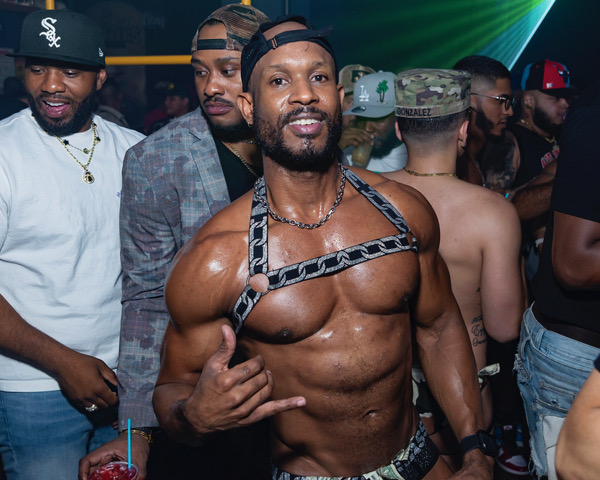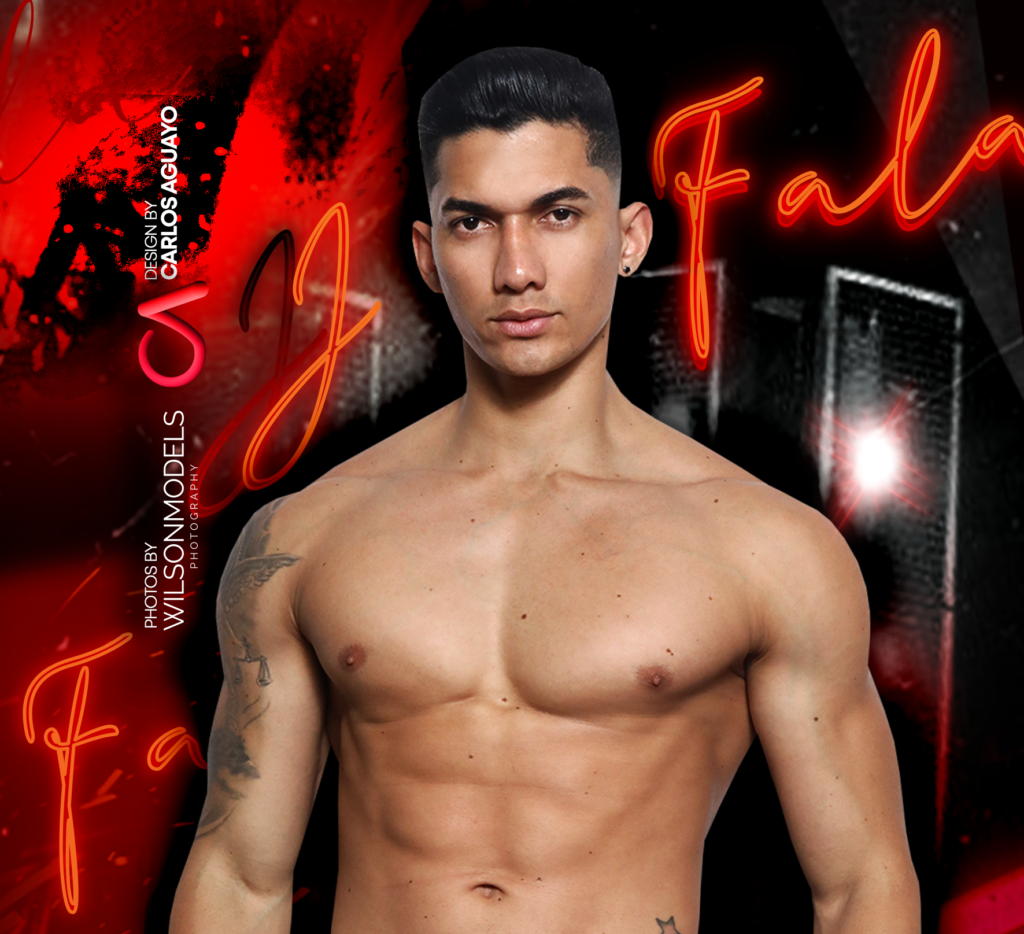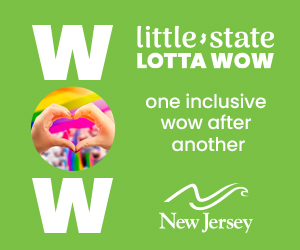Boy George ‘LIFE’: A Lesson in Joyful Cynicism
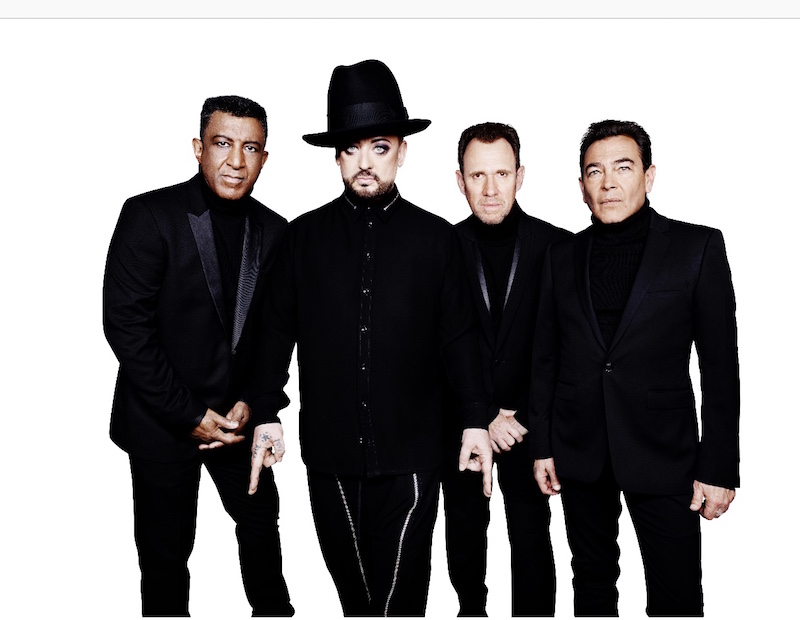 With all that has happened whilst on your quest through time, you can either feel sorry for yourself or treat your tragedies as a gift. Everything is either an opportunity to grow or an obstacle to keep you from growing. You get the choice. Boy George chose “LIFE.”
With all that has happened whilst on your quest through time, you can either feel sorry for yourself or treat your tragedies as a gift. Everything is either an opportunity to grow or an obstacle to keep you from growing. You get the choice. Boy George chose “LIFE.”
On the brink of releasing their first album in almost 20 years, Boy George and Culture Club’s highly anticipated new album, “LIFE,” will be available worldwide on Oct. 26, 2018. “LIFE” vibrantly delivers on every universal realm, a soulful and effervescent journey from the ‘80s Depeche Mode-adorned London tenements through the decadent city club scene and on to the coconut-strewn beauty of Jamaican beaches and the charm of the old, dusty shantytowns. Each of these settings is an emotional canvas for the band to paint their stories of love and loss, and passions and relationships, both personal and spiritual. The writing of “LIFE” is a sublime and riveting representation of a confident flamboyance that needs to be heard and understood, much like the personality of Boy George himself.
Boy George and Culture Club have been one of the most recognizable voices in pop music for more than 30 years. With more than 150 million single/album sales worldwide during their career, Boy George and Culture Club—consisting of Mikey Craig, Roy Hay and Jon Moss—are a cultural phenomenon in the world of entertainment, music royalty with the longevity that rivals the Queen of England.
Individually, George sheds sparkling circuits of illumination in each orgasmic track, intimately allowing the planet to share his dark, romantic essence. Simultaneously captivating and disturbing, like many cases of madness, the brilliance is evident.

I think the best way to talk about the album is to consider each track individually, one at a time. Perhaps it would be cool to describe the inspiration behind each song?
I’ll do anything you want. The first track is “God and Love.” I thought in a way “God and Love” was the most out-of-context song on the record, because there’s a groove on there and a lot of funk and soul on the record. I think “God and Love” stood out for me. I mean, I love it, but it’s not necessarily reflective of the rest of the record. It kind of confuses people a little bit, like, “Oh, where is this going,” because I felt like the rest of the track was sort of an obvious narrative. “God and Love” is really about faith. It’s about love and the belief in an all-powerful entity. People say they are spiritual, but it’s not something you have to say; it’s something you have to do. When people tell you they love you, it’s also something they have to prove. It’s not good enough just to say, at least not in my world.
I feel like you are very spiritual.
I think that being spiritual is something that you aim towards. It doesn’t have a conclusion. It’s one of those things that you have to kind of keep working at. I think it’s the same with love. With “God and Love” there are things you have to do. It’s not enough to go around saying “I love you”—and I’m loving. These people spit out spiritual gobbledygook: “Bless the universe,” all this religious hyperbole. When you are in love with somebody, you have to show them that you love them by doing things to express your love. And they don’t have to be great big, huge sound effects. It could just be as simple as nicking a bunch of flowers in a graveyard. So yeah, that’s what that song’s about, kind of a call to arms. My way of saying, “If you love me, honey, let me see it!”
I’ve always been a bit like that. I mean, I think my songs have always been kind of questioned, not only to other people but also to myself. I think that music, when you want to manifest something, people say to write it down. A lot of spiritual people and psychologists will say to kind of write down what you want and what you want to achieve. I’m afraid, in a way, that’s what songs do. You kind of immortalize experience or certain emotion, whatever it may be, and at the time when you’re writing this song it’s the most important thing in the world. Several years on, perhaps you don’t feel that way. But I think a song can change with you. Some songs roll with you, and some songs you leave them behind. They don’t grow with you. There are some songs you can sing in 20 years, and they make more sense, like a song like “Victims.” That’s the sort of Culture Club classic; that kind of makes more sense now. This is the interesting thing about writing songs. What did Joni Mitchell say? “Songs are like tattoos.” I think it’s always interesting when you first put out a record how you feel about these songs, and then six months from now or a year from now. I’m very interested to see how I feel about this record next year—what this record does, where it takes us—because an album is a very powerful thing.
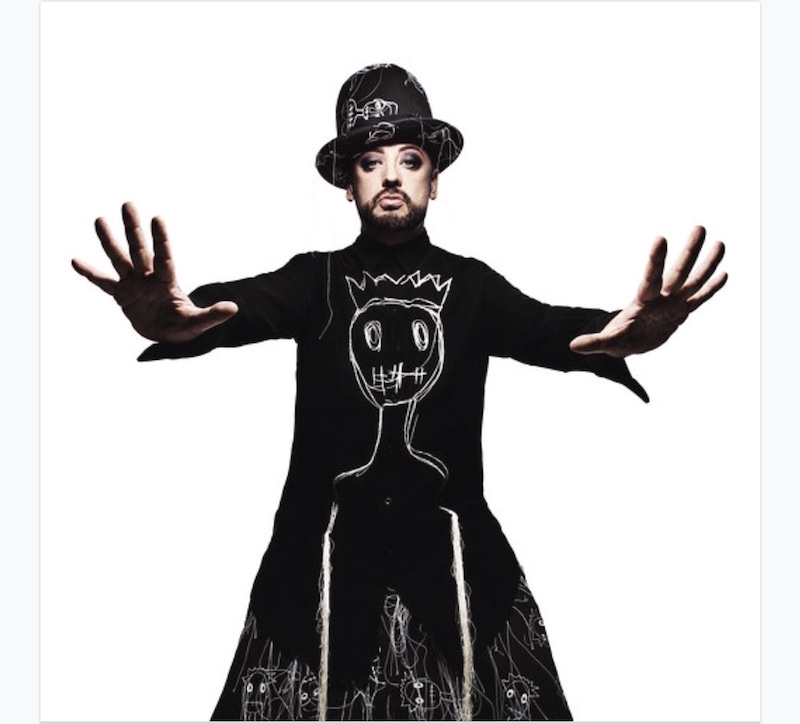
I felt this album to be super powerful. I felt like it came from your soul.
I think that I’m probably more present in my life than I’ve ever been, and that had to have an effect on the way I write. It’s hard for me to remember what state of mind I was in when I wrote other things. If you could go back and put yourself into that state of mind… But I think you can only express what you’re feeling right now. I think the universe is always kind of a reflection of where you are now, and what you’re feeling now. I would say that this record has a kind of positivity that I call a “joyful cynicism,” which is kind of an oxymoron. “Bad Blood” is about addiction, and that thing that happens when you’re famous and you surround yourself with people who don’t challenge you, and they are the bad blood in a way. The opening line [is], “This kingdom has its own rules, not one word out of place.” It’s also about being self-destructive. It’s quite a dark track. There is a saying, “Tragedy always seeks a hostage.” You want people around you who agree with you. I wasn’t sure about it as a track, and then when it arrived mixed, there was a lot of things in it I couldn’t hear before. It’s one of those tracks that totally took me by surprise. I thought I wasn’t going to like it, but when I heard the final mix, I thought, “Yeah, this is really good.” It’s kind of weighty and dark. It’s not obvious.
The lyrics are a perfect match for the music.
Yeah, it’s about surrounding yourself with “yes” people and not wanting to hear the truth. That’s about as dark as it gets.
“Human Zoo,” that is a really cool track.
I suppose after “Bad Blood,” it’s a breath of fresh air. Again, it’s working on the premise that there is someone out there for everybody. That’s what they say.
I believe it.
Yeah, I think when you are young you have a very rigid idea about what’s attractive. As you get older—I mean, I think this is for men more, because men are basically shallow.
So are many woman.
Woman in my experience will go for a guy with a sense of humor, or somebody with a bit of character, where men tend to like shiny, perfect things. “Human Zoo” is about being optimistic. There’s someone out there; there’s always someone for everybody. You have to look beyond your own ideas of what love is. When you get older, the way you see things is really changed. What you find attractive in your 50s is very different than what you find attractive in your 20s. I like the idea of love. I like the idea of that kind of wild, passionate love. But I think it’s very hard to find. I think that love happens when you least expect it. It’s about passion, it’s optimistic, it’s romantic. It’s about exposing yourself. At the end of the song, it’s like, “What you feel, what you feel, what you feel…tell me.” It’s about communication. Because I think as I’ve gotten older I’ve realized that if you want passion in a relationship, you have to express passion. Do you know what I mean?
Yeah.
Being a Gemini, I tend to expect everyone to read my mind.
Which mind, if you’re a Gemini?
Exactly. Especially in relationships. I’m realizing as I get older that I have to explain what I’m feeling to people, what’s going on in my head. I feel like the track is a little African without being about Africa.
Yeah, it’s weird. … I’m a big Paul Simon fan. It kind of reminds me a little of “Graceland.”
The next track is “Let Somebody Love You.”
When I am introducing this song I usually ask the audience, “Are you here with someone you love?” Sometimes that gets a big cheer, depending on where we are. Then I say, “If you’re not with someone you love, then you might be the problem,” which gets a big laugh. People aren’t expecting it. Then I say to the audience, “In order to be loved, you have to open yourself up to the validity that you are indeed lovable.” In this particular song I really got into the whole magic, realizing thing. I started to play around with that in my lyrics, sort of creating scenarios. Not necessarily about me. It was almost like writing a movie script. I tried to conjure up almost an essence of being young, fearless, thinking you are the cock of the hoop, that you’ve got the world at your feet. You know, it’s a nice feeling.
You are such a hopelessly dark romantic. I love it.
I think confidence makes you more attractive, doesn’t it? Like, the more confident you are… I definitely believe in manifestations. I’ve always said it, the universe reflects back what you feel about yourself.
Absolutely.
Sometimes, if you’re not aware of that, you don’t really necessarily feel the effects, but I’m kind of like a cynical optimist. I like the idea of “Let Somebody Love You.” Allow it to happen. It’s amazing if you allow it to happen.
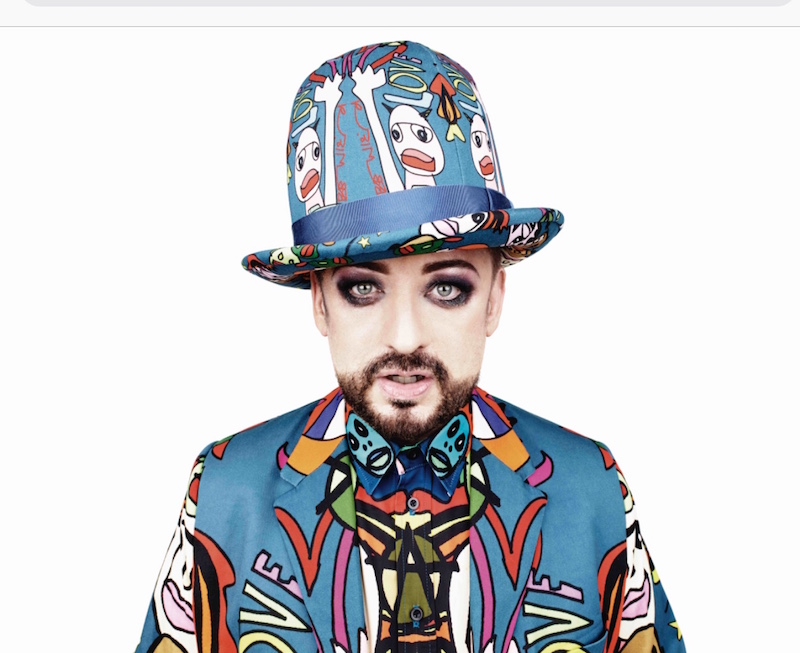
That statement in itself says it all.
There’s always someone that you’re searching about, trying to work out how they feel about you. The thing about love takes us back to the opening song. You can never really know how someone feels about you. That’s where faith steps in. You have to have faith. I talk about this a lot in my songs, the idea that to love is to risk being hurt. That’s the consequence of that action. I think that it’s an important thing to do. There’s so many people who say that relationships make them unhappy. I think that that’s something a bit different for me. Now, in my life I’d never be in a relationship with anyone that made me miserable.
“What Does Sorry Mean” is partly about my parents and my childhood growing up. But it’s mostly about my island auntie, who is the most beautiful woman in the world. She was kind of destroyed by love in a way. But it’s kind of a general song about women who love too much, women who are attracted to men that don’t hold the mark—like [in] the song, “Some guy will take a beautiful girl and hide her away from the rest of the world.” A lot of people, when they fall in love with someone, they just try to dismantle all the things that made that person attractive to them, because they are terrified that somebody else might feel the same way. Or maybe they have a really kind of distorted view of love, and this song is just about this woman who can’t keep away from this guy who hurt her continuously. She thinks she can change him. It’s not just women who do it; men do it too.
People think that if you love someone enough they’ll come around, they’ll become a different person.
I think my favorite part—in fact, myself and Roy came up with the melody, the bit where it goes, “She can’t go back, she can’t be alone. She can’t go back, she’s always checking the phone.” It doesn’t just apply to a boy and a girl. I’m always trying to write songs that provoke something. When I first started writing the lyrics to “Sorry,” I definitely was questioning myself about the opening line. But when I was recording it I got so emotional. I actually got very tearful. That’s when you know that something is special, when you write something yourself and you can step back from it. But when we were recording it, it was that—WOW, really powerful. It had that classic Culture Club, contradictory, melancholy, sweet, weird, cool, happy/sad, like an oxymoron. It’s very much like that. It’s very sad with a kind of joy, which kind of sums up the human condition sometimes. That’s a very powerful song, and I’m very interested to see how that resonates with the people. For me, that probably is the stand-out track from this record.
It’s an important track, and I think one of the deepest on the record.
Yeah, definitely. It’s very simple and powerful, I think. And that goes into “Runaway Train.” “(The Truth Is A) Runaway Train” was originally a complete country western. There are versions of it online that were kind of like almost a tribute to Johnny Cash. When the guy sent me back the new version I thought, this is a different song. I thought, this isn’t going to work. Then I sat with it for a few days and thought, this is really odd. It was almost like a painting over a painting. But now I can’t ever imagine it being any other way. The song is a travel log. It’s about a photo tour I did about five or six years ago. It was just about traveling, the whole thing about being on the road, holing up in different places. It doesn’t really make any sense, though. It does and it doesn’t. Actually, what I’m saying is, don’t trust the truth. It’s very, very current right now. I don’t mean it in a Washington sense. I would say we’re held together by the things we don’t say. This song evokes a kind of spirit, but it doesn’t make much sense. I don’t think songs have to make sense. I used to think songs had to make sense, and maybe some songs do have to make sense, but this song doesn’t. When I talk about this song at the gigs, what I say is this song is about two things: It’s about the truth and it’s about trains. When I was a kid I used to love trains, because they got me out of suburbia. The truth is something I’ve always kind of struggled with in the sense that when I see how my life turns on a dime, making the wrong decisions, or maybe not being truthful to myself… I actually just contradicted myself. On one hand, I’m saying it’s not about anything, but actually it’s about everything. I suppose it’s about purity. It’s about trusting that the people that love you really love you, and understand you, they have your back. I think about everything I’ve been through in the last 20 years. That’s interesting, because I didn’t actually think that song was about anything, and now I think it’s about everything.
When I heard the song I felt like it was about slices of your life.
That line, “You know I loved you like I loved you then,” maybe I’m talking to myself, maybe I’m talking to someone else. But I suppose through my experiences in love through the years I have gone full circle and have come back, which is a bit like a train journey. I think it’s about what the journey does to you emotionally and how it kind of reshapes the way you look at things, and makes you reevaluate stuff.
That works. How about “Resting Bitch Face.” I love the title.
It’s about a dysfunctional relationship. It could be real, I’m not sure, and it’s about passion. I was talking earlier about passion: You have to provide that. It’s no good demanding that somebody else behave the same way that you’re not prepared to behave yourself. I’ve definitely been guilty of that in my life. I suppose this song is about accepting the limitations in a relationship: enjoy it while it’s happening. Don’t expect it to be gone with the wind. Don’t expect it to be anything more than it is. Maybe you’re none of the things I think you are. In a weird, strange way, you can project so much onto another person. You could almost turn them into a superhero or a mythical character that often has nothing to do with what they are, and then be disappointed when you don’t get what you want, then ending up with a resting bitch face. Do you know what I mean? Like, you’ll never change, yet here I am, trying to make you change, trying to force you to be someone that you’re not. And I’m going to end up being disappointed. So it’s kind of humorous. You know what this person is, you know this person is not going to give you what you need. What’s that song, “If you can’t be with the one you love, love the one you’re with.” You know you’re gonna be disappointed, but maybe the sex is amazing!
I think that everyone goes into a relationship hoping they’ve found a superhero, but deep down inside they know that’s not true.
We all end up with a sort of resting bitch face. I suppose that in a way, if you can accept the limitations in a relationship, or in any situation in your life, maybe you’ll be happier. It’s kind of like, you know what this is, you know where it’s going, so deal with it, or you’ll end up disappointed.
Alright, “A Different Man.” Explain that one.
In an interview I read on Sly Stone from Sly and the Family Stone, at the time he was living in his car—I suppose in a way I know how bad things can get. The song is really about how do you recover from the pitfalls of your life, whether it be drug addiction, a fucked-up relationship, a bankruptcy, whatever it may be. You have to change the way you look at stuff. That’s very true in recovery. If you want to really recover, you have to just change your mindset. The message is things can be different, but you have to change the way you look at life.
Initially it was about Sly Stone, and then I threw myself into the mix. What were the things that changed my life? I think it was just being able to think differently, and as a result being able to feel differently. I’m not the person I was 10 years ago. The way I thought before, sobriety was verging on insane. When I think of Sly Stone, I think of him as a musical genius. I always say to people when I do that song, if you’re in any doubt about the genius of Sly Stone, go home and put on Spotify or whatever and listen to that album “Fresh.” It’s like a funk overture. When I first heard “If You Want Me to Stay” by Sly and the Family Stone, it’s an amazing piece of work. It’s a song with no chorus. I heard it when I was a rocker. A friend of mine, Rhonda, had that album, and she put on that track, and I literally lost my mind. If you want to understand what I’m saying, you’ll have to listen to it afterwards.
OK, I will.
It’s amazing. You probably do know it; it’s in there somewhere. I suppose in a way it’s a tribute to recovery and to the genius of Sly Stone. That was the music I was listening to in the ‘70s. The music I listened to in the ‘70s really shaped who I am as a musician much more than any other decade.
That’s really interesting. I never would have thought that. So the next track is “Oil and Water.”
Again, it’s opposites attract. It’s about two people that shouldn’t be together. It’s definitely a recurring theme. There’s a line in the song saying, “Here we are now, pathological strangers. You choose to say I fall apart.” That’s when you really fall for someone, and they take control of you. Then it says, “Looking in from the outside, what can you see clearly.” When you’re in the madness of a relationship, it’s almost impossible for somebody from the outside to understand what you’re going through or feeling. I would say, in my life, that most of the people I was attracted to I would say were complete opposite in terms of the way they felt about things, the way they lived their lives. I definitely don’t go to like-minded people. These days I go for gentle people. I like gentle people. But in terms of relationships, this song is about oil and water—they just don’t go together. There are some beautiful lyrics in that song. It’s quite James Bond-y, that song.
The next song goes into “More Than Silence.” We re-recorded it for this record. I really like it. Like “Runaway Train,” I was a little bit dubious about re-recording it. I really like what we’ve done with this new version. I think “More Than Silence” is a really special song. I love it. It has our band spirit about it. It’s a love song. It’s about what I said earlier, being held together by the things we don’t say. I’ve always been fascinated by the noise of silence in relationships. You can be really, really, really close and intimate with someone and yet know that if you say one thing, that one sentence can topple an empire. You can feel like you know someone intimately, but you also know if I say this one thing they won’t understand me or they will just condemn me. I suppose that “More Than Silence” is about communication.
I feel like it’s very Bowie-esque.
There is definitely Bowie in there. There’s a little bit of U2 in there, and that’s not accidental either.
The last track on the album, the record’s namesake, “Life”—what inspired that?
I suppose in a funny little way, it kind of ties in what I was talking about in “God and Love,” because “Life” is about faith. It’s about believing in the universe, it’s about believing things will get better, having patience, waiting for the train and hoping that the train is going to take you where you want to go. I’ve always had this kind of strange optimism. Even in the weirdest, darkest moments of my life, I’ve always had this weird feeling that things are going to get better. I suppose in a way when I was writing the lyrics to that song, I was consciously trying to write something that meant something to me. I wanted to write a lyric that resonated with who I am now, and how I feel right now. I hope that everyone has someone in their life that inspires them to be the best person of yourself every day. With the whole trust thing, and as cynical as I am, I have a strange faith in other people, faith in humanity, and obviously faith in myself.
I’ve been on a very interesting journey the last 15 years. I’ve been through a lot of stuff. I think “Life” is a song to myself. There was a point in my life where I was down a hole with no ladder, and I remember saying to myself, “How do I make this better? You really fucked this up, and now you have to fix it.” And that’s what I’ve been doing for the last 15 years. I really think that this record is kind of proof of all that. When we talked about getting the band back together four or five years ago, I remember saying, “We have to have new music.” For me, nostalgia, as beautiful as it is, it isn’t enough for me. So I said to them that we had to make new music. There was a little bit of resistance. Having made this record, what is really beautiful is that everybody said, “You’re right.” When we were doing the video for “Let Somebody Love You,” the joy was really palpable. I was saying to Mikey, he was so happy, and I was reminding him of a conversation we had a couple years ago. I said, “Remember that conversation?” And he said, “Yeah, I hated you.” I said, “Yeah, but I was right, right?”
Are you familiar with “The Secret”?
I’m a big fan of manifestations, putting things out there. I watch a lot of inquiring people talking all the time. I have read “The Secret,” and I’m always reading things like that. I do believe that what you put out there makes a big difference. Sometimes you have to go against what other people feel, and sometimes you have to be quite strong and say to people, “This isn’t the right time,” or “This is what I feel we need to do to make it work,” and that’s really what happened with the band. It’s an ongoing thing. It’s never done. You’re constantly going around in a circle, trying to make sense of all the madness.
I feel that you were one of those people who knew you were destined to become a star.
What’s a star? I think it’s confidence, isn’t it? The way I look at it, what gives me the most pleasure is creating things. In terms of music, there is nothing more exciting than having an idea, strumming it out on a guitar, perfecting it, recording it, making it into a piece of art. There’s nothing better than that. Sharing it with other people, seeing their reaction. There’s nothing better than creating stuff. I feel blessed that I am able to do that pretty much every day. I’d like to make another record.

If you were to put out a next single, what would it be?
The next single would be “Life,” but you have to look at this record as a body of work. It’s a beautiful cake. People are going to take slices of it. I think that’s an old-fashioned way of thinking. I don’t think that applies anymore. It’s really the whole record that’s important, not the singles. There are so many ways to connect with people now, and those rules are constantly changing. I don’t know what the future holds, but all I care about is that people get to hear the record, however they get to hear it.
Your doing a massive “Life” tour. Have you had your ultimate stage fantasy yet?
No.
What would you need to happen?
What you do strive for is those shows where you actually enjoy it as well. You’re up there working and entertaining people, but if you can hit that spot where you can come off stage and say, “I really enjoyed that gig…” I’m the kind of person that comes off stage and says, “Oh, that wasn’t right.” It’s rare there are times that I come off stage and say, “I really enjoyed that gig,” and everybody is smiling.
The songwriting is relentlessly and unapologetically personal, giving us an insight into the sheer genius that George has become, genius forged in the fires of celebrity and stardom, catastrophic falls from grace, and now with this album genius formed from self examination and the sheer joy of “Life”. By the finale of this album, you will be able to say with dazzling confidence, “George, I understand you and appreciate you.”

